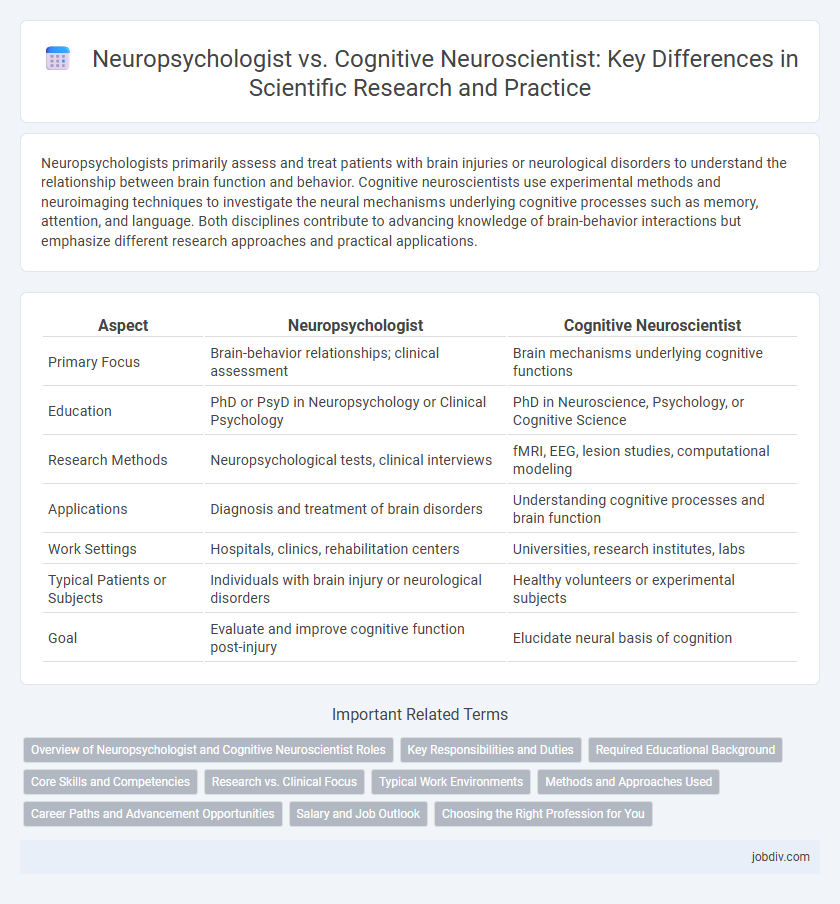Neuropsychologists primarily assess and treat patients with brain injuries or neurological disorders to understand the relationship between brain function and behavior. Cognitive neuroscientists use experimental methods and neuroimaging techniques to investigate the neural mechanisms underlying cognitive processes such as memory, attention, and language. Both disciplines contribute to advancing knowledge of brain-behavior interactions but emphasize different research approaches and practical applications.
Table of Comparison
| Aspect | Neuropsychologist | Cognitive Neuroscientist |
|---|---|---|
| Primary Focus | Brain-behavior relationships; clinical assessment | Brain mechanisms underlying cognitive functions |
| Education | PhD or PsyD in Neuropsychology or Clinical Psychology | PhD in Neuroscience, Psychology, or Cognitive Science |
| Research Methods | Neuropsychological tests, clinical interviews | fMRI, EEG, lesion studies, computational modeling |
| Applications | Diagnosis and treatment of brain disorders | Understanding cognitive processes and brain function |
| Work Settings | Hospitals, clinics, rehabilitation centers | Universities, research institutes, labs |
| Typical Patients or Subjects | Individuals with brain injury or neurological disorders | Healthy volunteers or experimental subjects |
| Goal | Evaluate and improve cognitive function post-injury | Elucidate neural basis of cognition |
Overview of Neuropsychologist and Cognitive Neuroscientist Roles
Neuropsychologists assess and treat cognitive, emotional, and behavioral effects of brain injuries and neurological disorders by conducting detailed psychological testing and clinical interventions. Cognitive neuroscientists investigate brain functions related to mental processes such as memory, attention, and perception, employing neuroimaging techniques like fMRI and EEG for research purposes. Both roles contribute to understanding brain-behavior relationships but differ in clinical versus experimental focus and methodologies.
Key Responsibilities and Duties
Neuropsychologists primarily assess and treat cognitive deficits and behavioral changes resulting from brain injuries or neurological disorders, using standardized tests to evaluate memory, attention, and executive functions. Cognitive neuroscientists investigate neural mechanisms underlying cognitive processes such as perception, language, and decision-making through experimental techniques like functional MRI and electrophysiology. Both disciplines emphasize brain-behavior relationships, but neuropsychologists focus on clinical diagnosis and rehabilitation, while cognitive neuroscientists concentrate on fundamental research and neural system mapping.
Required Educational Background
Neuropsychologists typically require a doctoral degree in clinical psychology with specialized training in neuropsychology, including extensive clinical internships and postdoctoral fellowships focused on brain-behavior relationships. Cognitive neuroscientists generally pursue a PhD in neuroscience, psychology, or cognitive science, emphasizing research methodologies such as neuroimaging and experimental design to study neural mechanisms of cognition. Both fields demand strong foundations in brain anatomy, psychology, and statistical analysis, but neuropsychologists prioritize clinical practice while cognitive neuroscientists focus on basic research.
Core Skills and Competencies
Neuropsychologists specialize in assessing and diagnosing brain-behavior relationships using clinical neuropsychological tests and patient evaluations, with core competencies in cognitive assessment, neuroanatomy, and psychological theory. Cognitive neuroscientists focus on researching neural mechanisms underlying cognitive processes, requiring expertise in brain imaging techniques, experimental design, and computational modeling. Both fields demand strong analytical skills and a deep understanding of cognitive functions but differ in their emphasis on clinical practice versus experimental research.
Research vs. Clinical Focus
Neuropsychologists specialize in assessing and treating cognitive and behavioral effects of brain injuries or neurological conditions through clinical evaluations and interventions. Cognitive neuroscientists primarily conduct research on brain mechanisms underlying mental processes using techniques like fMRI and EEG. While neuropsychologists apply findings in clinical settings to improve patient outcomes, cognitive neuroscientists focus on understanding brain function and cognition from a research perspective.
Typical Work Environments
Neuropsychologists primarily work in clinical settings such as hospitals, rehabilitation centers, and private practices, where they assess and treat cognitive impairments related to brain injuries or neurological disorders. Cognitive neuroscientists typically conduct research in academic institutions, laboratories, and research centers, utilizing neuroimaging technologies like fMRI and EEG to explore brain function and cognitive processes. Both professions may collaborate with multidisciplinary teams but differ fundamentally in their applied clinical practice versus experimental research environments.
Methods and Approaches Used
Neuropsychologists primarily utilize clinical assessments, standardized neuropsychological tests, and behavioral observations to evaluate cognitive functions and diagnose brain disorders. Cognitive neuroscientists employ neuroimaging techniques such as fMRI, PET, and EEG to study brain activity and understand neural mechanisms underlying cognition. While neuropsychologists focus on correlating brain injury or dysfunction with cognitive deficits, cognitive neuroscientists emphasize mapping cognitive processes to specific brain regions using advanced experimental paradigms.
Career Paths and Advancement Opportunities
Neuropsychologists primarily focus on assessing and treating cognitive and behavioral impairments caused by brain injury or neurological disorders, often working in clinical settings or rehabilitation centers. Cognitive neuroscientists conduct research to understand the neural mechanisms underlying cognitive functions, typically employed in academic institutions or research laboratories. Career advancement for neuropsychologists involves board certification and specialization in clinical populations, while cognitive neuroscientists progress through research publications, grant acquisition, and tenure-track positions.
Salary and Job Outlook
Neuropsychologists typically earn an average annual salary ranging from $75,000 to $120,000, with variations depending on experience and location, while cognitive neuroscientists often earn between $70,000 and $110,000 annually, influenced by research funding and academic positions. The job outlook for neuropsychologists is expected to grow about 10% over the next decade, driven by increasing demand for brain injury and neurological disorder assessments. Cognitive neuroscientist roles are projected to see a steady growth of approximately 8%, fueled by advancements in brain imaging technologies and expanding research opportunities.
Choosing the Right Profession for You
Neuropsychologists specialize in assessing and treating brain-behavior relationships through clinical evaluations and therapeutic interventions, often working with patients experiencing cognitive impairments or neuropsychological disorders. Cognitive neuroscientists conduct experimental research to understand the neural mechanisms underlying cognitive functions using tools like fMRI, EEG, and neuroimaging techniques. Choosing the right profession depends on whether you prefer direct clinical practice focusing on patient care or research-driven exploration of brain function and cognition.
Neuropsychologist vs Cognitive Neuroscientist Infographic

 jobdiv.com
jobdiv.com